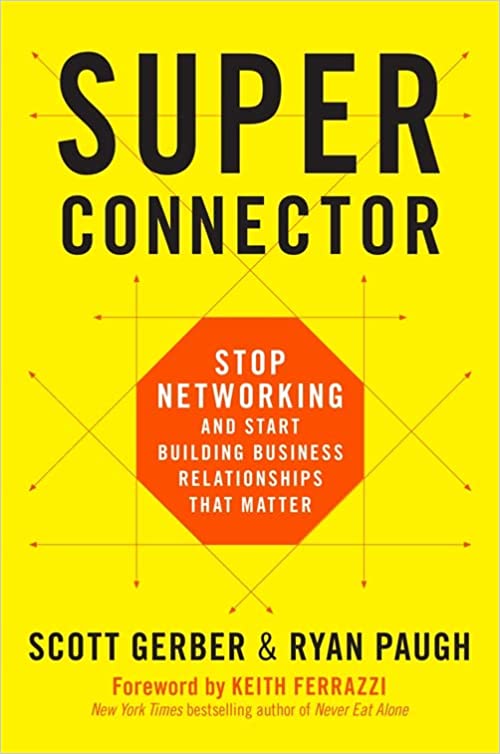
Super Connector: Stop Networking and Start Building Business Relationships That Matter - by Scott Gerber and Ryan Paugh
Date read: 2020-11-20How strongly I recommend it: 6/10
(See my list of 150+ books, for more.)
Go to the Amazon page for details and reviews.
Why just connect with people when you can be a "super connector?" This book has a few good nuggets and suggestions on how to get past the standard small talk and get the most out of your network, but I felt the examples were not always that relevant and were too few. Some good ideas but I feel there are other books out there that are better re: networking that talk about how to leverage weak ties.
My Notes
Superconnectors are a new category of tradespeople born out of the social media era. They are highly valuable community builders who make things happen through their keen understanding and utilization of social capital-that is, the people you meet and the standing you have with them.
Superconnectors are people who just seem to know everyone.
They understand the power of relationship building, and they purposefully bring people or groups together with the intention to create mutual value. They are emotionally intelligent and empathetic. They understand how to uncover the needs and desires of those they aim to connect, even if those people don't clearly know what they're looking for themselves.
Connecting is about finding out what the other person needs and how you can help. You want to understand the real value you have to offer instead of the value you think you need to deliver.
There are 3 types of connectors:
- Thinkers - are curious to the max. They have a hundred ideas a minute; they're just not always the best at executing them.
- Enablers - can assemble people together and share ideas with them. Enablers love to introduce people to one another.
- Connection Executors - are the accomplishers. They take other people's ideas and make them happen.
A curious person doesn't usually accept the first response to a question as the answer. Instead, they just see it as the outer layer. Good questions have answers that are like layers of an onion-you can continue to peel them away. The deeper you go with follow-up questions leads to layers with more depth and value than the layers before.
You get to decide with whom you spend your precious time, building hands-on, deep relationships. But don't overextend yourself by trying to connect with too many people and doing too many things at once! By keeping that inner circle small, you'll be surprised how much more good you'll be able to do for the larger community of people in the world who care about the same things that you do.
At the top of the pyramid is the person you want to reach. In order to reach him or her, you want to go lower on the pyramid. Those are the people who are the Influencers, the ones who have unfettered access to the person in charge. That could be their spouse. Or assistant.
Knowing how and when to give gifts is just as important as what to give. I don't spend one dime on gifting between Thanksgiving and Christmas, because that's the obligatory time. If you want to connect with people, you want to do it as a surprise. We call it "Planned Randomness."
Superconnectors are generous with their time and spirit. They derive pleasure from giving. They truly enjoy doing favors for others.
If you lost your job tomorrow, besides your parents, who would you send your first five emails to? Who are the people from your past you need to invest the most time in to bring them into your present?
Connectors are more interested in the gray zones, in the subtle nuances that make us all unique. What are the other person's likes and dislikes, the things you don't find on their Facebook or LinkedIn profiles? If someone says to you, "I like asparagus, the proper response is not 'Great!' but 'Why? What is it about those skinny green stalks that speaks to you?'"
Whenever we talk with someone new, we never walk away thinking, "What a great chat." Rather, what's coursing through our minds is "How can I provide strategic value for you, even if you're not asking me to right now?"
Ask "What are you working on?" instead of "What do you do?"
You are not there to talk about yourself. You are trying to learn what the other person is about. If a question ends with a yes or no statement, then you have not done your job.
Good friends don't make for good business, but good business makes for good friends.
The Superconnector is not a participant! We are merely facilitators-background scenery at best. Many people try to turn everything back to themselves, but that's exactly what a connector should not do, especially not at their own event.
LinkedIn is always a great place to start in terms of getting background on someone, but we also like to look at the "News" section of search results to see if they've been recently picked up by any press outlets or have a column of their own someplace reputable.
Steve Sims, CEO of The Bluefish, often uses video text, where he takes a video, records it, and sends it on.
You need to know which type of person you are. Do you gather and share the best content for your network (aka curator), or do you see yourself as a creator of such high-value content (aka creator)?
In order to properly reverse-engineer success, you need to troubleshoot an ask and ask yourself one simple question: "Why will my ask fail?" This will help you improve or clarify your ask, disuade you from making a half-baked or bad ask, and give you the confidence to proceed.